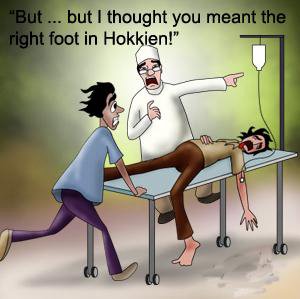
You know the "No Dialect" policy formulated by the authorities in the 70s has been a success when you tried explaining to a local medical staff the condition of your medical ailment in the hospital.
Yesterday, my mum complained of breathlessness and I brought her to the A&E of a hospital. She was admitted but, thankfully, was discharged today.
Upon admission, we were first attended to by a local Chinese nurse who started asking my mum her medical history in Mandarin. Not knowing Mandarin, my mum broke into Hokkien only to have the nurse looking askance at me. I asked the nurse if she was local. She replied yes but added that though she was not very conversant in Hokkien, she has little problem understanding the spoken dialect. But it was clear she was "struggling" trying to hold the conversation with my mum. I thought that situation in the hospital was potentially dangerous. A miscommunication could have given rise to a misdiagnosis, could it not?
My wife, also a nurse, told me that at the hospital where she works, many of the local Chinese doctors and nurses speak little dialect, if at all. Most of them are in the early 20s. These days, she not only has to translate the non-Chinese doctors' prescriptions to the elderly; she has to do the same for the Chinese doctors.
Surely, this is the consequence of the "No Dialect" policy implemented in the 1970s. I'm not about to embark on a tirade on why this policy of "No-dialect" on national TV or movies should be relaxed (some would say it already has – just look at Jack Neo's movies). There's no doubt that the gahmen has the best of interest of our country when they implemented that policy, the objective of which I have no desire to repeat here. But personally, I feel that it's quite a shame that our children should loss the heritage of their dialects. My mum, the care-giver uses Hokkien to communicate with my kids, whom I'm proud to say, speaks good Hokkien by today's standard. Many kids and young adults of today don't.
If you can recall the SARS days in Singapore, the authorities allowed medicorp artistes to make speeches on SARS awareness on TV and the radio. Of course, the targeted audience was the elderly, many of whom know only dialects and may be blissfully unaware of the peril of he SARS virus. But why should it take a crisis in order for dialects to be used on national TV?
4 comments:
My nieces and nephews in Ipoh learn Chinese, English and Malay in school and speak Cantonese and Mandarin at home. I am pretty sure their teaching methods and facilities and not superior to those in Spore; and they certainly are not more intelligent than our kids. Why?
I always thought that the No Dialect policy actually contributed to a deterioration in Mandarin rather than help to improve. Our leaders underestimate the capacity of the human brain; they think we have a fixed no. of gigabytes. They think it is a zero-sum game. Actually more important is interest. Depriving our children of access to dialect leads to erosion in interest in Chinese culture and history, which leads to loss of interest in the language.
In Spore our educators have got the sequence wrong. Teach them Chinese, to give them a passport to learn Chinese culture, then do biz with Chinese etc. It should be: expose them to Chinese culture, they learn the language then the others fall in place.
Above is just my layman opinion of course.
BTW, what happen to our friend Victor. Seems to be awfully quiet. Hope he is not unwell. Maybe OC imposed a curfew. Haha.
Perhaps another reason is the lowering of standard in the teaching of the chinese language in schools. I think the emphasis is on speaking.
I am alive and kicking, thank you very much for your concern, Chun See. (I see that you are just as observant as me, if not more.) I was quite busy lately, installing my Ikea furniture for the PC myself, just to save the 5% installation fee. After that, the new PC arrived and quite a lot of setting up to do. Then moved the old PC into my room and set up a home wireless network. And lastly getting the kids ready for school tomorrow. Got lots of last minute things to get - the elder one is going for a 4-day camp tomorrow. Don't understand why they have to schedule it right at the beginning of the school term. Must be part of their innovative education policy again.
Regarding the 2nd language policy, I think the MM spoke about it on national TV a few months ago. If I remember correctly, he realised that it was unrealistic to expect most of our students to be able to master 2 main languages (usually English and Chinese). He was definitely not talking about letting them learn more languages.
Thankfully, our leaders have shown that they are not averse to making U-Turn on policies ill-received, or rather policies that need to be relooked as and when the need arises. The mother tongue language policy is one. And of course, the latest U-Turn concerns the Buangkok MRT. How did that come about? The white elephant cut-outs perhaps? Or the coming GE? Your guess is as good as mine.
Post a Comment